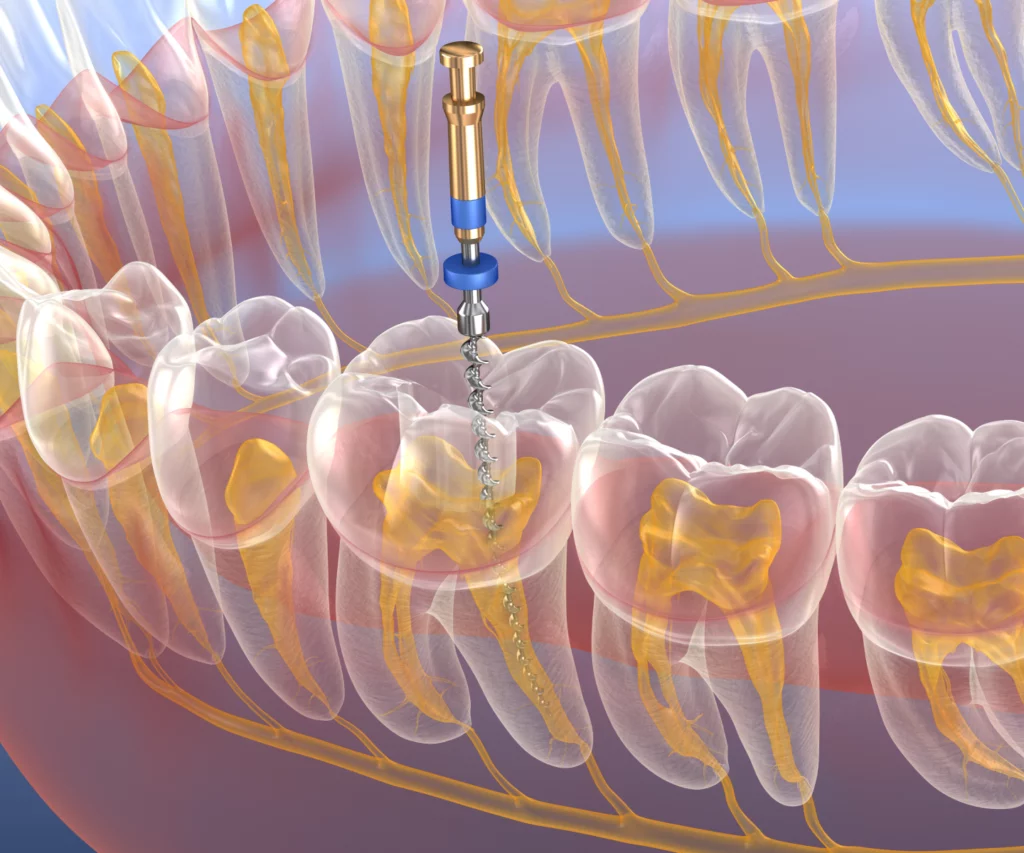Root Canal Treatment in Los Angeles
Lost Angeles residents who need root canal treatment can turn to the experts at West LA Endodontics. Our endodontic dental professionals are ready to help heal your tooth infection, stop your pain, and prevent complications. Give us a call today to see why endodontics, and the team West LA Endodontics, are your best option for root canal treatment.

What is Root Canal Treatment?
Root canal treatment is a dental treatment to heal a tooth infection. The treatment removes infected pulp from the inside of your tooth. Infected pulp causes pain and inflammation. Over time it can also cause damage to your teeth, gums, and jaw. An untreated infection can even spread to other parts of your body and can cause you to become ill. A root canal treatment stops the infection and the pain.
Symptoms of needing Root Canal Therapy
Tooth Pain
Tooth pain that lasts for more than a day or day is often a sign you should see a dentist. Pain that is deep, throbbing, and that you can also feel in your face, jaw, and surrounding teeth can be a sign you need a root canal.
Pain when you eat
Tooth pain when you eat or press on the top of your tooth can be a sign of an infection that needs root canal treatment.
Swollen gums
If you notice that your gums look puffy or swollen, or if your gums are tender when you touch and brush them, it could indicate an infection.
Sensitivity to temperature
An infection pain in your tooth when you eat or drink food that is either very hot or very cold.
A swollen jaw
Your jaw can swell when you have an infection in your tooth and gums.
A bump that resembles a pimple on your gums
A bump filled with bacteria can grow on your gums when you have an infection. This is a sign of abscess and indicates you need root canal treatment.
A discolored tooth
An infection can change how much blood gets to your tooth. This can make your tooth look darker than normal.
A loose tooth
An infection can weaken and soften the bone that supports your tooth and cause it to become loose in your gum.
A chip or crack in your tooth
Chips and cracks can let bacteria into your tooth and cause infection.
How is a root canal performed?
A root canal is performed in an endodontic office. Once a dentist tells you that you need a root canal, you’ll have digital dental x-rays taken to assess the infection. On the day of your root your canal, your endodontist will take these steps:
1
Numbing your tooth and gums and sedation
Your gums and teeth will be numbed with anesthesia to ensure that you’re not in pain during your root canal therapy. You might have sedation as well. Sedation can help keep you calm and relaxed during the procedure.
2
Placing a rubber barrier
Your infected tooth will be isolated from the surrounding teeth using a small rubber barrier called a dental dam.
3
Creating an access hole
A tiny hole will be made in the top of your infected tooth so that the dentist can remove the pulp.
4
Removing the pulp
The pulp of your tooth will be carefully removed.
5
Cleaning the empty space
Once the pulp has been removed, the dentist will clean out the empty space and disinfect it to ensure all bacteria is completely removed. They’ll then reshape the inside of the tooth so that it can be filled.
6
Filling the empty space
The dentist will fill your tooth with dental cement.
7
Sealing the hole
You’ll have a temporary filling placed on the top of your tooth to seal the tooth and protect the newly placed dental cement.
8
Receiving a crown
This will need to be completed by your general/referring dentist.
DID YOU KNOW
That while most infected teeth are easily identified by the symptoms they cause, some produce no discomfort at all? It is important to visit your dentist regularly for routine exams that may reveal diseased teeth that would otherwise go unnoticed. Failure to treat an infected tooth could result in the death of the tooth and total loss. Worse, the infection can spread to other areas of the body, causing potentially life-threatening conditions.
FAQs
Do I need root canal treatment?
What should I expect to happen during my root canal?
Will I need to follow any post-operative instructions following my root canal treatment?
How much is a root canal in Los Angeles?
Why are root canals done in 3 visits?
Is a root canal treatment painful?
